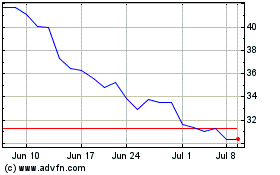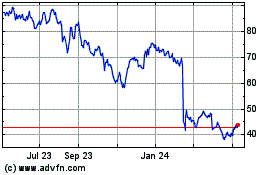Easy-to-use, visually read test could expand
testing to diverse point-of-care locations
Quidel expects manufacture ramp up to
600 million QuickVue® tests per year run rate by end of
2021
Quidel Corporation (NASDAQ: QDEL) (“Quidel”), a leading
provider of rapid diagnostic testing solutions, cellular-based
virology assays and molecular diagnostic systems, announced today
that Quidel has received Emergency Use Authorization (EUA) from the
U.S. Food and Drug Administration (FDA) to market its QuickVue®
SARS Antigen test, a point-of-care assay for the rapid, qualitative
detection of the nucleocapsid protein antigen from SARS-CoV-2 in
anterior nares (NS) swab specimens directly from individuals who
are suspected of COVID-19 by their healthcare provider within the
first five days of the onset of symptoms.
Quidel’s new QuickVue SARS Antigen test requires no supplemental
instrumentation and is visually read. It offers excellent
performance for the detection of SARS-CoV-2 (96.6% PPA versus PCR
and 99.3% NPA versus PCR) in anterior nares swab samples, yielding
results in just 10 minutes, thereby providing quick, reliable
results to patients, their families and healthcare workers
alike.
“We are proud to introduce yet another powerful diagnostic tool
to aid the fight against COVID-19,” said Douglas Bryant, president
and CEO of Quidel Corporation. “The QuickVue® rapid antigen test
for coronavirus leverages our proven QuickVue® visually read
diagnostic platform for influenza A+B to further democratize access
to affordable and highly accurate COVID-19 testing across a diverse
range of medical and point-of-care locations.”
“The flexibility of QuickVue® for meeting the urgent testing
needs of everyone from school systems to rural areas and even
locations without electricity gives us the opportunity to do
enormous good in communities across our nation and the world,” Mr.
Bryant noted. “We will scale immediately to supply the more than
30,000 QuickVue® professional market customers we serve today and
look forward to extending the benefits of this technology as
broadly and rapidly as possible in the months and years ahead.”
Quidel plans to reach a production run rate of 600 million
QuickVue® tests per year by the end of 2021.
Background Information:
Quidel was the first company to receive EUA from the FDA for a
rapid point-of-care antigen test for COVID-19 and remains at the
forefront of the battle against the coronavirus pandemic.
Quidel developed the first visually read lateral flow flu test,
the QuickVue® Influenza A/B Test, which received FDA approval in
September of 1999. QuickVue® was also the first flu test cleared by
the FDA for use in CLIA-Waived point-of-care facilities like
doctors’ offices, urgent care clinics and pharmacies.
QuickVue® is a market leading platform for visually diagnosing
Influenza, respiratory syncytial virus (RSV), Strep A and a variety
of other illnesses. Since its approval in 1999, more than 150
million QuickVue® units have been sold.
Sofia® 2 is Quidel’s best-selling cartridge-based,
instrument-read rapid diagnostic system for infectious disease
testing, which utilizes fluorescent chemistry design, an intuitive
graphical user interface, and optics system to provide a highly
accurate, objective and automated result in 15 minutes. The Sofia®
2 system also comes connected to Virena®, Quidel’s data management
system, which provides aggregated, de-identified testing data to
public health authorities in near real-time.
Quidel recently doubled its production of Sofia® rapid antigen
tests to the current rate of approximately two million tests per
week. Quidel is building additional production lines that will more
than double its current capacity once again. Quidel’s goal is to
reach a run-rate of over 240 million Sofia® tests per year by the
third quarter of 2021.
It is noteworthy that Quidel’s QuickVue® and Sofia® SARS Antigen
test kits are made in San Diego, California.
About Quidel Corporation
Quidel Corporation (Nasdaq: QDEL) is a leading
manufacturer of diagnostic solutions at the point of care,
delivering a continuum of rapid testing technologies that further
improve the quality of health care throughout the globe. An
innovator for over 40 years in the medical device industry, Quidel
pioneered the first FDA-cleared point-of-care test for influenza in
1999 and was the first to market a rapid SARS-CoV-2 antigen test in
the U.S. Under trusted brand names Sofia®, Solana®, Lyra®, Triage®
and QuickVue®, Quidel’s comprehensive product portfolio includes
tests for a wide range of infectious diseases, cardiac and
autoimmune biomarkers, as well as a host of products to detect
COVID-19. With products made in America, Quidel’s mission is to
provide patients with immediate and frequent access to highly
accurate, affordable testing for the good of our families, our
communities and the world. For more information about Quidel, visit
quidel.com.
Forward-Looking Statements
This press release contains forward-looking statements within
the meaning of the federal securities laws that involve material
risks, assumptions and uncertainties. Many possible events or
factors could affect our future financial results and performance,
such that our actual results and performance may differ materially
from those that may be described or implied in the forward-looking
statements. As such, no forward-looking statement can be
guaranteed. Differences in actual results and performance may arise
as a result of a number of factors including, without limitation:
the impact and duration of the novel virus (COVID-19) global
pandemic; funding and compliance risks relating to government
contracts, including the ability to meet key deliverables and
milestones under our NIH RADx-ATP contract; our ability to
accurately forecast demand for our products and products in
development, including in new market segments; adverse changes in
competitive conditions, the reimbursement system currently in place
and future changes to that system, changes in economic conditions
in our domestic and international markets, lower than anticipated
market penetration of our products, our reliance on sales of our
influenza and COVID-19 diagnostic tests, fluctuations in our
operating results resulting from the timing of the onset, length
and severity of cold and flu seasons, seasonality, government and
media attention focused on influenza and other respiratory or novel
viruses and the related potential impact on humans from such
viruses, the quantity of our product in our distributors’ inventory
or distribution channels, changes in the buying patterns of our
distributors, and changes in the healthcare market and
consolidation of our customer base; our development, acquisition
and protection of proprietary technology rights; our ability to
develop new technologies, products and markets and to commercialize
new products; our reliance on a limited number of key distributors;
our exposure to claims and litigation that could result in
significant expenses and could ultimately result in an unfavorable
outcome for us, including the ongoing litigation between us and
Beckman Coulter, Inc.; intellectual property risks, including but
not limited to, infringement litigation; our ability to finance our
capital or operating needs; the financial soundness of our
customers and suppliers; acceptance of our products among
physicians and other healthcare providers; competition from other
providers of diagnostic products; failures or delays in receipt of
new product reviews or related to currently-marketed products by
the U.S. Food and Drug Administration (the “FDA”) or other
regulatory authorities or loss of any previously received
regulatory approvals or clearances or other adverse actions by
regulatory authorities; changes in government policies; costs of
and adverse operational impact from failure to comply with
government regulations in addition to FDA regulations; compliance
with government regulations relating to the handling, storage and
disposal of hazardous substances; third-party reimbursement
policies and potential cost constraints; our failure to comply with
laws and regulations relating to billing and payment for healthcare
services; our ability to meet demand for our products;
interruptions or shortages in our supply of raw materials and other
components; product defects; business risks not covered by
insurance; costs and disruptions from failures in our information
technology and storage systems; our exposure to data corruption,
cyber-based attacks, security breaches and privacy violations;
competition for and loss of management and key personnel;
international risks, including but not limited to, compliance with
product registration requirements, compliance with legal
requirements, tariffs, exposure to currency exchange fluctuations
and foreign currency exchange risk, longer payment cycles, lower
selling prices and greater difficulty in collecting accounts
receivable, reduced protection of intellectual property rights,
social, political and economic instability, increased financial
accounting and reporting burdens and complexities, taxes, and
diversion of lower priced international products into U.S. markets;
changes in tax rates and exposure to additional tax liabilities or
assessments; our ability to identify and successfully acquire and
integrate potential acquisition targets; our ability to manage our
growth strategy and identify and integrate acquired companies or
technologies and our ability to obtain financing; the level of our
deferred payment obligations; that our Revolving Credit Facility is
secured by substantially all of our assets; the agreements for our
indebtedness place operating and financial restrictions on us and
our ability to operate our business; that an event of default could
trigger acceleration of our outstanding indebtedness; that we may
incur additional indebtedness; dilution resulting from future sales
of our equity; volatility in our stock price; provisions in our
charter documents and Delaware law that might delay or impede
stockholder actions with respect to business combinations or
similar transactions; and our intention of not paying dividends.
Forward-looking statements typically are identified by the use of
terms such as “may,” “will,” “should,” “might,” “expect,”
“anticipate,” “estimate,” “plan,” “intend,” “goal,” “project,”
“strategy,” “future,” and similar words, although some
forward-looking statements are expressed differently. The risks
described in reports and registration statements that we file with
the Securities and Exchange Commission (the “SEC”) from time to
time, should be carefully considered. You are cautioned not to
place undue reliance on these forward-looking statements, which
reflect management’s analysis only as of the date of this press
release. Except as required by law, we undertake no obligation to
publicly release any revision or update of these forward-looking
statements, whether as a result of new information, future events
or otherwise.
View source
version on businesswire.com: https://www.businesswire.com/news/home/20201221005119/en/
Quidel Contact: Quidel Corporation Randy Steward Chief Financial
Officer (858) 552-7931
Media and Investors Contact: Quidel Corporation Ruben Argueta
(858) 646-8023 rargueta@quidel.com
QuidelOrtho (NASDAQ:QDEL)
Historical Stock Chart
From Oct 2024 to Nov 2024

QuidelOrtho (NASDAQ:QDEL)
Historical Stock Chart
From Nov 2023 to Nov 2024
